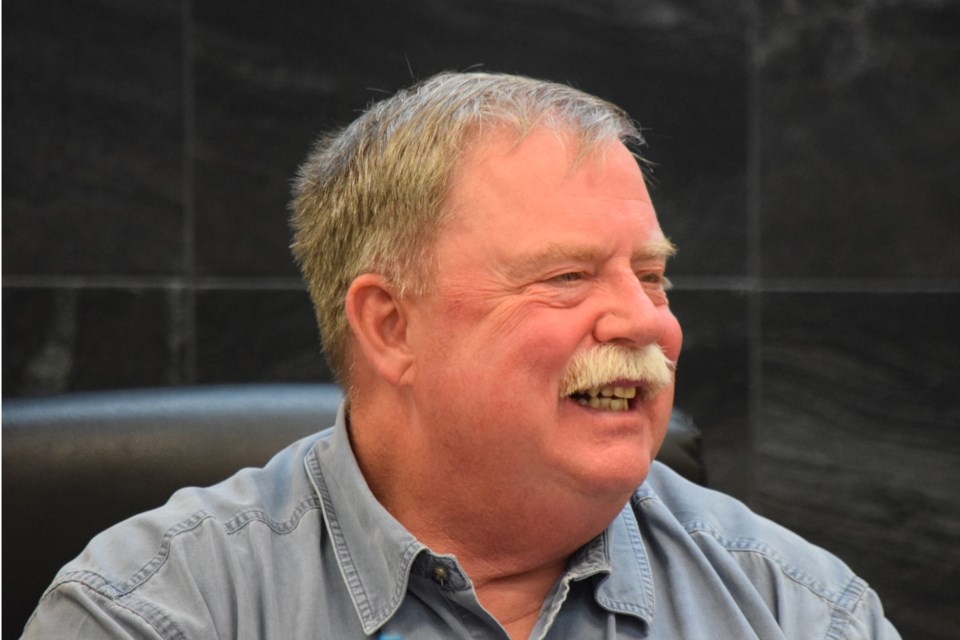BARRHEAD-There are better ways to accomplish the same goals.
That is what County of Barrhead reeve Doug Drozd and Town of Barrhead mayor Dave McKenzie said when they learned about a request Town of Whitecourt council has made to the province.
In mid-May, on behalf of the council, Whitecourt mayor Maryann Chichak penned a letter to Alberta Municipal Affairs Minister Kaycee Madu asking him to consider merging rural and urban municipalities in the province to larger regional centres to gain efficiencies in administration and services, reducing costs as well as be more competitive for investment money in an economy where such funding is at a premium.
Madu responded stating municipalities already have the option of exploring amalgamation. After receiving his response, council authorized Chichak to restate their request via a letter to Premier Jason Kenney.
However, both Drozd and McKenzie say there are other ways to accomplish the same goals.
It should be noted that in September 2014 the Town of Barrhead initiated the amalgamation process to merge Barrhead's municipalities. The town started the process due to a dispute over what councillors felt was the county's unwillingness to contribute what they deemed as fair to the operation costs of jointly-used recreation facilities.
Municipal Affairs turned down the request for amalgamation. The dispute ended after the municipalities signed a long-term recreation agreement through binding arbitration. The agreement came into effect Jan. 1, 2018. Since then, with the largest issue of contention out of the way, relations between the municipalities have been greatly approved.
County of Barrhead response
Drozd said he believed there were other mechanisms available to solve disputes between neighbouring municipalities as well as tools to increase collaboration and efficiencies of jointly-delivered services.
"I think we have a good model and I can't imaging there is anyone in the County of Barrhead that wants to give up any more autonomy in the decision-making process," he said. "You want to keep the decision making local so you can make the best decisions for the people in your community."
Drozd added the service levels, as well as the type of services residents, require generally differ greatly between urban and rural municipalities and it would be difficult for a larger, regional municipality to meet the expectations of both communities.
He said he was also surprised the Town of Whitecourt did not consult or inform more municipalities that they were bringing the idea forward to Municipal Affairs, noting they did not learn about the Whitecourt initiative until contacted by the Town and Country This Week, a sentiment echoed by McKenzie.
Drozd also suggested there are other tools which neighbouring municipalities can use to increase efficiencies and reduce costs of delivering services, noting the various agreements municipalities sign with each other as well as joining province’s nine Regional Economic Development Alliances (REDA) such as GROWTH Alberta. In the mid-1990s, the Alberta government decided there needed to be more coordination between several ad hoc community alliances. Its purpose is to create economic growth through marketing.
He also suggested Whitecourt is premature in advocating the province to consider merging urban and rural municipalities.
ICF agreements are established between neighbouring municipalities on a wide variety of issues that impact both communities such as recreation, shared water and sewer to joint land planning.
These agreements were made mandatory under the province’s revised Municipal Government Act (MGA).
The deadline for coming to these agreements between rural (county) and urban (town) municipalities was April 1, 2020, but the province extended the deadline due to COVID-19. Rural to rural municipalities have until April 1, 2021.
"We haven't had a chance to test that mechanism yet," he said. "[In theory] that gives you the tools, if you don't feel you are being fairly dealt with by a neighbouring municipality, you can open talks and if they are not successful, go to mediation and arbitration."
Town of Barrhead response
McKenzie agreed with Drozd saying merging urban and rural municipalities isn't necessary, saying local governments have many tools at their disposal.
He added even when the Barrhead municipalities were at loggerheads coming to a recreation agreement, the communities were able to collaborate in several areas of mutual interest, saying the key is to have open communication.
"[The province intended ICFs] as a catalyst to help municipalities talk to each other," McKenzie, adding it is surprising how little communication there is between some neighbouring municipalities. "There are cases where the mayor and reeve haven't even met."
He also questioned how much municipalities were competing for government grants or private investment dollars, noting most of the time applications for this type of funding is for specific projects.
"If you have a bag of money and divvy it up to a larger regional municipality you've created a different competition pool because you still have competing interests inside the region vying for that for that funding," McKenzie said. "You are still trying to divide a pie that isn't big enough to try to meet everyone's needs and that is hard to do."
As for an economy of scale being more cost-effective due to increased buying power, he said municipalities can achieve the same effect through communication and coordination.
McKenzie noted that the municipalities administration and coordinate with each other often making joint bids or using the same contractors to get the best "bang for the buck".
"It's a matter of building up a good working relationship and being able to negotiate," he said.



